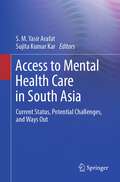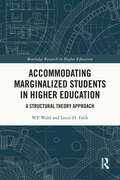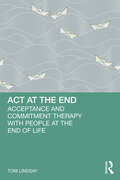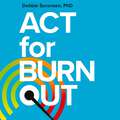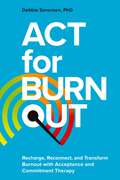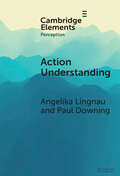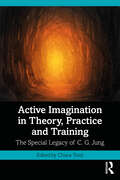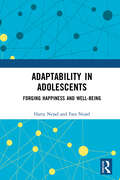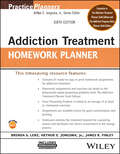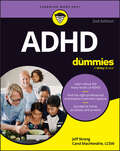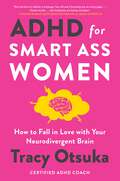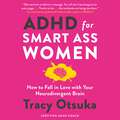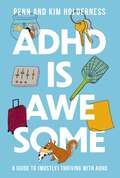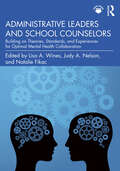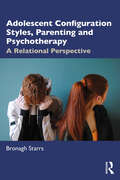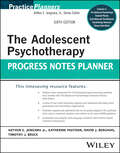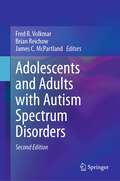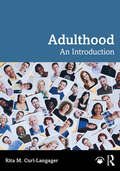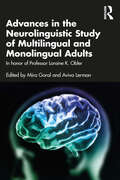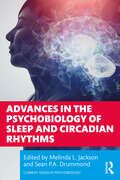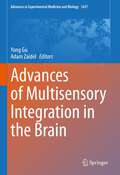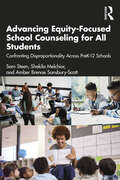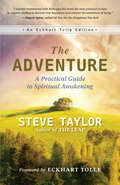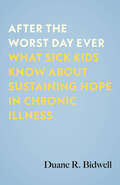- Table View
- List View
Access to Mental Health Care in South Asia: Current Status, Potential Challenges, and Ways Out
by S. M. Yasir Arafat Sujita Kumar KarThis book is about access to mental health care in South Asia. South Asia consists of eight countries with low and middle-income backgrounds. The region contains a combined population of about 2 billion, making up about a quarter of the global population. The people of this region share common cultures, beliefs, and behavioral patterns regarding physical and mental health. Among them, about 15% (about 300 million) have been suffering from common mental disorders. However, there is a persisting high treatment gap for mental illness in the region. Hence, despite having a mental illness, only a small percentage of the population is able to have access to essential mental healthcare. Though governments are trying to bridge the gap by improving mental health policies and programs, it is still a major challenge delivering mental healthcare to all people in need. Due to the income category and dual disease burden of the countries, there are some additional enduring challenges like poor funding and research, inadequate and inequitable manpower, huge out-of-pocket expenses, poor mental health literacy, income disparity, and high stigma. This book aims to highlight the issues related to accessing mental health services in a densely populated low and middle-income setting. This book is the first of its kind in comparing and contrasting the delivery status of mental health services in South Asian countries.
Accommodating Marginalized Students in Higher Education: A Structural Theory Approach (Routledge Research in Higher Education)
by WP Wahl Louis H. FalikThis book defines and examines the needs of the marginalized student and presents a theoretically grounded model to guide institutions of higher education toward developing new and more effective programmatic responses. Taking the implementational experience of the University of the Free State (UFS) in Bloemfontein, South Africa, as a case study, it investigates the experience of students who present problems of learning and inadequate preparation for sustained performance, including learning disabilities, lack of study skills, motivational factors, and cultural support systems. Further, it identifies the pressure for institutions to be responsive to social and political pressures to accommodate the needs of students previously excluded from participation in higher educational or vocational training opportunities. In addressing this timely area of development, the authors formulate a unique conceptual foundation for the consideration of a new paradigm, based on cognitive and biosocial theories: those of the theory of structural cognitive modifiability and mediated learning experience and of Feuerstein and Bronfenbrenner’s ecosystem structural orientation. Innovative, applicational, and optimistic in nature, this book will appeal to scholars, researchers, administrators, and postgraduate level students working across the fields of higher education, educational psychology, and student counseling.
ACT at the End: Acceptance and Commitment Therapy with People at the End of Life
by Toni LindsayACT at the End is based on the principles of Acceptance and Commitment Therapy (ACT), and while it has a grounding in research, it is also a hands-on clinical guide for those working with people at a tricky and complex time of life. This treatment manual is arranged to support clinicians in stepping through common concerns and addressing the ways that people at this stage of life may require psychological support as well as strategies for supporting clinicians working in this space. The guide provides a formulated ACT approach to address each element of the Hexaflex, as well as work around self-compassion and using ACT approaches to support difficult decision making.This book provides examples that clinicians will be able to apply to their own practices and tools that they can use to troubleshoot clinical concerns. It’s a helpful companion to clinicians navigating challenging terrain—much in the way that someone might turn to a colleague for advice, it is open and accessible, while still recognizing the ways in which that the work is hard.
ACT for Burnout: Recharge, Reconnect, and Transform Burnout with Acceptance and Commitment Therapy
by Debbie Sorensen"I know what it's like to care deeply about my work and yet feel utterly exhausted by it."Burnout is more widespread than ever before, and it's time to do something about it.Rooted in Acceptance and Commitment Therapy (ACT), this book delves into the systemic, cultural, and economic contexts that contribute to burnout, and gives you the tools to exit the cycle. Exercises and reflection questions help you reconnect with your values to find what's really important, and disentangle yourself from unhelpful thought patterns. By engaging with your emotions rather than avoiding or suppressing them, ACT allows you to respond more effectively and become re-engaged in your own life again. This book will show you how to move out of the burnout cycle, reconnect with meaningful aspects of your work, and make changes that last.
ACT for Burnout: Recharge, Reconnect, and Transform Burnout with Acceptance and Commitment Therapy
by Debbie Sorensen"I know what it's like to care deeply about my work and yet feel utterly exhausted by it."Burnout is more widespread than ever before, and it's time to do something about it.Rooted in Acceptance and Commitment Therapy (ACT), this book delves into the systemic, cultural, and economic contexts that contribute to burnout, and gives you the tools to exit the cycle. Exercises and reflection questions help you reconnect with your values to find what's really important, and disentangle yourself from unhelpful thought patterns. By engaging with your emotions rather than avoiding or suppressing them, ACT allows you to respond more effectively and become re-engaged in your own life again. This book will show you how to move out of the burnout cycle, reconnect with meaningful aspects of your work, and make changes that last.
Action Understanding (Elements in Perception)
by null Angelika Lingnau null Paul DowningThe human ability to effortlessly understand the actions of other people has been the focus of research in cognitive neuroscience for decades. What have we learned about this ability, and what open questions remain? In this Element the authors address these questions by considering the kinds of information an observer may gain when viewing an action. A 'what, how, and why' framing organises evidence and theories about the representations that support classifying an action; how the way an action is performed supports observational learning and inferences about other people; and how an actor's intentions are inferred from her actions. Further evidence shows how brain systems support action understanding, from research inspired by 'mirror neurons' and related concepts. Understanding actions from vision is a multi-faceted process that serves many behavioural goals, and is served by diverse mechanisms and brain systems.
Active Imagination in Theory, Practice and Training: The Special Legacy of C. G. Jung
by Chiara TozziBased on extensive research and developed with the support of the IAAP, this fascinating new work presents the precious value of the special legacy of C.G. Jung, which he himself defined as Active Imagination, through a collection of unpublished contributions by some of the brightest Jungian analysts and renowned representatives from the worlds of Art, Culture, Physics and Neurosciences. In addition to presenting the genesis, development and results of Chiara Tozzi's research on Active Imagination, this volume on Theory, Practice and Training will also include the fundamental theoretical aspects of this technique. The book explores Active Imagination in relation to fundamental contents of Analytical Psychology, such as Individuation, Transformation and comparison with the Shadow, the four psychological functions, C.G. Jung's Red Book, and more. Moreover, the connections between Active Imagination and Sandplay will also be explored, as well as the possibilities of applying the technique with adolescent patients, how it’s considered and proposed in Jungian Training, and some innovative clinical methodologies of Active Imagination. Spanning two volumes, which are also accessible as stand alone books, this essential collection will be of great interest to Jungian analysts, psychologists, psychoanalysts, or anyone interested in discovering more about the fascinating psychotherapeutic practice of Active Imagination and its interdisciplinary uses.
Active Imagination in Theory, Practice and Training: The Special Legacy of C. G. Jung
by Chiara TozziBased on extensive research and developed with the support of the IAAP, this fascinating new work presents the precious value of the special legacy of C.G. Jung, which he himself defined as Active Imagination, through a collection of unpublished contributions by some of the brightest Jungian analysts and renowned representatives from the worlds of Art, Culture, Physics and Neurosciences.In addition to presenting the genesis, development and results of Chiara Tozzi's research on Active Imagination, this volume on Theory, Practice and Training will also include the fundamental theoretical aspects of this technique. The book explores Active Imagination in relation to fundamental contents of Analytical Psychology, such as Individuation, Transformation and comparison with the Shadow, the four psychological functions, C.G. Jung's Red Book, and more. Moreover, the connections between Active Imagination and Sandplay will also be explored, as well as the possibilities of applying the technique with adolescent patients, how it’s considered and proposed in Jungian Training, and some innovative clinical methodologies of Active Imagination.Spanning two volumes, which are also accessible as stand alone books, this essential collection will be of great interest to Jungian analysts, psychologists, psychoanalysts, or anyone interested in discovering more about the fascinating psychotherapeutic practice of Active Imagination and its interdisciplinary uses.
Adaptability in Adolescents: Forging Happiness and Well-Being
by Harry Nejad Fara NejadThis book discusses a newly developed concept of adaptability capacity and development as an extension of Charles Darwin’s work on adaptability. It looks at how the human mind uses adaptability resources to deal with life-changing, challenging, and varying circumstances and conditions. The volume presents an integrative process model that assesses the roles of socio-demographic and ability covariates, personality, and other dispositional presage factors in predicting psychological well-being outcomes, such as life satisfaction, happiness, and self-esteem. While exploring the concept of adaptability capacity, the volume focuses on making children and adolescents mentally, emotionally, and behaviorally adaptable. It discusses general and domain-specific constructs relevant to phenomena such as self-regulation, resilience, buoyancy, and coping mechanisms. The book focuses on the development and utilization of treatments to assist individuals in becoming positively adaptable and achieve a higher degree of positive well-being and self-actualization. An important contribution, this book will be of interest to students, researchers and teachers of psychology, educational psychology, and social work. It will also be helpful for academicians, mental health professionals, social workers, psychiatrists, counsellors, and those working in related areas.
Addiction Treatment Homework Planner (PracticePlanners #209)
by Brenda S. Lenz Arthur E. Jongsma Jr. James R. FinleyA hands-on homework toolkit for mental health practitioners treating clients with substance use disorders In the newly revised sixth edition of the Addiction Treatment Homework Planner, a team of distinguished clinicians delivers a practical and effective resource for clients who wish to keep their therapy and recovery efforts front-of-mind and incorporate them into their daily lives. The activities and homework contained within will assist clients—and the clinicians treating them—to collect real-time data, enabling practitioners to address relevant issues quickly and collaboratively. This Homework Planner is designed as a companion manual to the sixth editions of the Addiction Treatment Planner and Addiction Progress Notes Planner. It focuses on client-centered, assessment-driven, evidence-based treatment in the field of substance use disorder psychotherapy. Each included exercise is designed to: Emphasize the importance of client motivation and increase the knowledge, awareness, and insight of people moving through the addiction recovery process Incorporate a skills component for further instruction in therapy or at home Be completed or processed within individual sessions or – where appropriate – within group therapy sessions and at various levels of careAn indispensable, hands-on resource for counselors, therapists, psychiatrists, psychologists, and other mental health professionals engaged in the treatment of patients with substance use disorders, the Addiction Treatment Homework Planner is a time-saving tool with the potential to improve patient outcomes and increase client engagement.
ADHD For Dummies
by Jeff Strong Carol MacHendrieDemystify ADHD with simple explanations of the basics and the latest research Attention deficit hyperactivity disorder (ADHD) is one of the most globally prevalent neurodevelopmental disorders. ADHD For Dummies explores living a healthy and fulfilling life with ADHD, from seeking diagnosis to choosing the right treatment path for you or your loved one. You’ll read about the latest in ADHD research, equipping you with valuable knowledge as you care for a child with ADHD or explore your own ADHD symptoms as an adult. This book provides the answers you need on how to deal with day-to-day challenges at home, school, and work, and how to find support and counseling. With appropriate management, anyone can live a great life with ADHD. Learn what ADHD is—and what it isn’t Get up to date with the latest information on ADHD, including medications and non-medical treatments Find the right professional to help you get the support you or your children needThis is the perfect Dummies guide for both parents of children with ADHD and adults with ADHD looking to learn more. Teachers, counselors, and therapists—this is also a great resource to educate yourself and your clients.
ADHD For Smart Ass Women: How to fall in love with your neurodivergent brain
by Tracy OtsukaADHD is one of the most common neurological disorders in the United States - yet a staggering 75 percent of girls and women remain undiagnosed. Due to the gender gap in medical research, which does not account for symptoms manifesting differently in women - leading to increased problems with anxiety, depression, working memory, sleep, energy and concentration - many ADHD women are left to navigate a society that fails to understand their struggles and gifts. But what if every woman had the resources and support to uncover the hidden wonders of her neurodivergent brain?Enter certified ADHD coach and podcast host Tracy Otsuka. Armed with her experience coaching thousands of women, cutting-edge medical research and personal insights from her own diagnosis, she presents a revelatory guide tailored specifically for girls and women with ADHD. In it, Otsuka offers an entirely new set of tools, systems, and strategies to access a world of boundless productivity, focus, and confidence.With her signature wit and levity - in entertaining chapters designed for ADHD readers - Otsuka explores the unique challenges that ADHD women face and illuminates the extraordinary qualities that set them apart: overflowing creativity, laser-focused attention, deep empathy, and fearless entrepreneurial spirit. Even without an official diagnosis, readers will be equipped with the tools to conquer any to-do list and to tap into their true purpose, personally or professionally. Otsuka offers a beacon of hope for any woman looking to transform her symptoms into strengths. Comprehensive, lively and long overdue, ADHD for Smart Ass Women is the key to unlocking unparalleled potential and to understanding your truly magnificent and brilliant brain.
ADHD For Smart Ass Women: How to fall in love with your neurodivergent brain
by Tracy OtsukaADHD is one of the most common neurological disorders in the United States - yet a staggering 75 percent of girls and women remain undiagnosed. Due to the gender gap in medical research, which does not account for symptoms manifesting differently in women - leading to increased problems with anxiety, depression, working memory, sleep, energy and concentration - many ADHD women are left to navigate a society that fails to understand their struggles and gifts. But what if every woman had the resources and support to uncover the hidden wonders of her neurodivergent brain?Enter certified ADHD coach and podcast host Tracy Otsuka. Armed with her experience coaching thousands of women, cutting-edge medical research and personal insights from her own diagnosis, she presents a revelatory guide tailored specifically for girls and women with ADHD. In it, Otsuka offers an entirely new set of tools, systems, and strategies to access a world of boundless productivity, focus, and confidence.With her signature wit and levity - in entertaining chapters designed for ADHD readers - Otsuka explores the unique challenges that ADHD women face and illuminates the extraordinary qualities that set them apart: overflowing creativity, laser-focused attention, deep empathy, and fearless entrepreneurial spirit. Even without an official diagnosis, readers will be equipped with the tools to conquer any to-do list and to tap into their true purpose, personally or professionally. Otsuka offers a beacon of hope for any woman looking to transform her symptoms into strengths. Comprehensive, lively and long overdue, ADHD for Smart Ass Women is the key to unlocking unparalleled potential and to understanding your truly magnificent and brilliant brain.
ADHD is Awesome: A Guide to (Mostly) Thriving with ADHD
by Penn Holderness Kim HoldernessThe engaging, uplifting antidote to traditional ADHD books (which, let's be honest, if you have ADHD you'd never read anyway).You live in a world that wasn't designed for you. A world where you're expected to sit still, stay quiet, and focus. Because of the way your brain is wired, you can feel like you&’re failing at life. But you are not failing. You are awesome.Award-winning content creators Kim and Penn Holderness are on a mission to reboot how we think about the unfortunately named "attention-deficit/hyperactivity disorder." As always, they are doing it by looking in the mirror, because they don't just study ADHD; they live it.Penn was in college when he was diagnosed with ADHD, although the signs of having a brain that worked just a little bit differently had been there since he was a kid. Rather than view the diagnosis as a curse or give in to feelings of inadequacy or failure, he took a different approach, one that he wants to share with fellow ADHDers and the people who care about them.Drawing on their often-hilarious insights and the expertise of doctors, researchers, and specialists; Kim and Penn provide fun, easy-to-digest advice and explanations, including:What it's actually like to live with an ADHD brain.How to find humor in the pitfalls, sob stories, and unbelievable triumphs (like the time they won The Amazing Race!) that come with ADHD.How to tackle the challenges ADHD presents with a positive outlook.Targeted tools and techniques to play to your unique strengths.Fun extras like ADHD Bingo, an ode to cargo pants, and what the world would look like if ADHDers were in charge.Take it from Penn: Having ADHD can be scary, but it comes with incredible upsides, including creativity, hyperfocus, and energy. You might even say it's kind of awesome. Whether you have ADHD or want to support someone else in their journey, this is the guide you need to make the life you want.
Administrative Leaders and School Counselors: Building on Theories, Standards, and Experiences for Optimal Mental Health Collaboration
by Lisa A. Wines Judy A. Nelson Natalie FikacThis practice-based text offers a roadmap to optimal collaboration for all school leaders – including counselors, superintendents, principals, and university faculty – to provide the best mental health outcomes for students. Administrative Leaders and School Counselors is a timely publication that creatively and cohesively authenticates the relationship between administrative leaders and school counselors. In order to systemically promote mental health consciousness and considerations for school counselors as practitioners and in training, collaboration among school leaders is essential for comprehensive school counseling programs, practices, funding, partnerships, and services designed for students. The first to feature perspectives from a diverse set of leadership positions in schools, the book provides individuals with exposure to educational leadership models and decisions that impact the roles of school counselors. The book will appeal to faculty who are teaching and training those who are or will ultimately be working as professional school counselors, counseling psychologists, or educational leaders such as principals, directors, department chairs, and superintendents.
Adolescent Configuration Styles, Parenting and Psychotherapy: A Relational Perspective
by Bronagh StarrsMental health has become the principal concern as adolescents struggle with a host of issues such as anxiety, academic pressures, gender, substances, social media, complicated family compositions and a vulnerable planet. This book provides psychotherapists with a clear theoretical understanding and practical application for navigating the increasingly complex adolescent experience as young people adjust and respond to the present- day world. Starrs presents a contemporary understanding of adolescence, identifying three principal character styles and offering experience- near descriptions of the modernday adolescent. The author demonstrates how each configuration style in adolescence elicits a predictable response in parents and examines the challenges and dilemmas facing parents in today’s world, highlighting the patterns and pitfalls which often render parental interventions ineffective. Developmentally attuned parenting strategies are outlined, pertaining to each configuration style. The in depth analysis of adolescent process and parental response has implications for the therapeutic encounter. Intervention focuses both on one- to- one work with the adolescent and parental involvement. The complexity of working with adolescents and parents who demonstrate psychological entrenchment is also outlined. This highly readable, original and exceptional contribution is suitable for psychotherapists, allied professionals and parents alike.
The Adolescent Psychotherapy Progress Notes Planner (PracticePlanners)
by Arthur E. Jongsma Jr. Katy Pastoor David J. Berghuis Timothy J. BruceSave hours of time-consuming paperwork with the bestselling planning system for mental health professionals The Adolescent Psychotherapy Progress Notes Planner, Sixth Edition, provides more than 1,000 complete prewritten session and patient descriptions for each behvioral problem in The Adolescent Psychotherapy Treatment Planner, Sixth Edition. Each customizable note can be quickly adapted to fit the needs of particular client or treatment situation. An indispensable resource for psychologists, therapists, counselors, social workers, psychiatrists, and other mental health professionals working with adolescent clients, The Adolescent Psychotherapy Progresss Notes Planner, Sixth Edition: Provides over 1,000 prewritten progress notes describing client presentation and interventions implemented Covers a range of treatment options that correspond with the behavioral problems and current DSM-TR diagnostic categories in the corresponding Adolesecent Psychotherapy Treatment Planner Incorporates DSM-5 TR specifiers and progress notes language consistent with evidence-based treatment interventions Addresses more than 35 behaviorally based presenting problems, including social anxiety, suicidal ideation, conduct disorder, chemical dependence, bipolar disorder, low self-esteem, ADHD, eating disorders, and unipolar depression Includes sample progress notes that satisfy the requirements of most third-party payors and accrediting agencies, including JCOA, CARF, and NCQA Features new and updated information on the role of evidence-based practice in progress notes writing and the status of progress notes under HIPAA
Adolescents and Adults with Autism Spectrum Disorders
by Fred R. Volkmar Brian Reichow James C. McPartlandThe second edition of this book examines the numerous research and practice advances with regard to adolescents and adults with autism spectrum disorders (ASD). Expert contributors offer cogent reviews of complex issues, from education to employment, leisure activities to illegal behaviors, mental health issues to medical health concerns. The volume explores the latest findings in key areas, such as psychosocial and residential treatments, social skills programs, epidemiology, the impact of ASD on families. The book focuses on areas of research and practice that require improved models of assessment, current data, new interventions, and increased support services. Key areas of coverage include: Transition from high school to adulthood for adolescents and young adults with ASD. Innovative programming to support college students with ASD. Romantic relationships, sexuality and ASD. Treatment of mental health comorbidities. Assessment and treatment planning in adults with ASD. The range of outcomes and challenges in middle and later life for individuals with autism. The second edition of Adolescents and Adults with Autism Spectrum Disorders is a must-have reference for researchers, professors, and graduate students as well as clinicians, therapists, and other practitioners in clinical child, school, and developmental psychology, psychiatry, social work, rehabilitation medicine/therapy, special education, and general practice/family medicine.
Adulthood: An Introduction
by Rita M. Curl-LangagerAdulthood: An Introduction offers a thorough foundation to learn, consolidate, and apply developmental concepts and current knowledge to the psychology of adult development. It illustrates major ideas with carefully selected research that is widely referenced and topically pertinent to development in early, middle, and late adulthood.This comprehensive text reviews the five domains of development, including biological development, cognitive development, personality development, social development, and ecological influences in development. It introduces multicultural perspectives and contexts in these discussions, as well as developmental themes such as nature and nurture, early and later experiences, and the individual’s active role. Accompanied by learning objectives and section reviews, vignettes portray numerous adult experiences, and commentaries for students offer additional information and interpretation with the students’ perspectives in mind.Designed to encourage students to think critically about topics of adulthood in both academic and applied settings, Adulthood is appropriate for undergraduate students in psychology and related disciplines, such as addiction studies, speech pathology, criminal justice, nursing, and business.Combined with a complete ancillary package, the book provides activities for individuals and groups, critical thinking questions, vignette-specific questions and responses, perspectives across disciplines, and much more. Additional resources for both students and instructors are available in the book's Support Material.
Advances in the Neurolinguistic Study of Multilingual and Monolingual Adults: In honor of Professor Loraine K. Obler (Psychology Press Festschrift Series)
by Aviva LermanThis edited volume examines current themes in the neurolinguistic study of multilingual and monolingual adults and highlights several new directions the field is moving toward. The organization of the book is as follows. Part I focuses on language processing in multilingual and monolingual adults, Part II explores language processing in multilingual and monolingual adults with dementia, and Part III centers on language processing in multilingual and monolingual adults with stroke-induced aphasia. Chapters feature empirical data and/or literature reviews, discussing the key issues in the field that are currently engaging scholars and practitioners with topics including language attrition, cognitive flexibility, aging and the brain, eye-tracking studies of aphasia, translanguaging, and multilingualism in dementia. The book includes cuttingedge research from researchers and practitioners who are all alumni and colleagues of Professor Loraine K. Obler, to whom this book is dedicated. Presenting crucial topics in the field, the book is highly relevant for students, researchers, and practitioners in the fields of neurolinguistics, psycholinguistics, sociolinguistics, applied linguistics, and language disorders.
Advances in the Psychobiology of Sleep and Circadian Rhythms (Current Issues in Psychobiology)
by Melinda L. Jackson Sean P.A. DrummondAdvances in the Psychobiology of Sleep and Circadian Rhythms features international experts from the fields of psychobiology, sleep research and chronobiology to address and review cutting-edge scientific literature concerning recent advances in the psychobiology of sleep, sleep disorders, such as sleep apnoea and insomnia, and circadian rhythms, across the lifespan. In this illuminating volume, Melinda L. Jackson and Sean P.A. Drummond bring together leading international researchers to review cross-cutting issues in the field, including sleep and pain, sleep and dementia risk, and sleep issues in paediatric populations as well as the interaction between sleep and health conditions in different populations. The chapters offer coverage of the major explanatory models which underpin the empirical work as well as a discussion of the relevant theoretical and conceptual models on issues arising with specific psychiatric and medical disorders, including depression, dementia, posttraumatic stress disorder and pain. They also address new research in the area of chronobiology, and circadian impacts on health and diseases. The chapters also discuss important methodological and ethical issues arising in research and include sections addressing implications for public policy and practitioner interventions in the context of different social and cultural environments. This volume will be a crucial resource for professionals, practitioners and researchers engaged in the field as well as for postgraduate and upper-level undergraduate students undertaking research in areas related to psychobiology, neuropsychology, health psychology and other disciplines such as biology, physiology and psychopharmacology.
Advances of Multisensory Integration in the Brain (Advances in Experimental Medicine and Biology #1437)
by Yong Gu Adam ZaidelThis book presents the latest research on multisensory brain function. Namely, the mechanisms by which the brain processes and integrates information from multiple sensory modalities. Its contents cover a broad range of topics, including optimal integration, cross-modal interactions, calibration, and causal inference – with an emphasis on their neuronal underpinnings. By bringing together efforts from different laboratories around the world we aim to collaboratively shed light on these fundamental brain processes, that underlie perception, cognition, and behavior in a complex multisensory world, and to spur innovation of brain-inspired technologies
Advancing Equity-Focused School Counseling for All Students: Confronting Disproportionality Across PreK-12 Schools
by Sam Steen Shekila Melchior Amber Brenae Sansbury-ScottUsing author narratives, this book brings attention to racial disparities that currently exist in schools within the historical context of pivotal legal cases in America while emphasizing the importance of assessing and supporting students through a culturally appropriate lens that recognizes student strengths. The authors provide current and historical frameworks through which school counselors can develop a more socially just and liberation-orientated school counseling program. These frameworks center and unveil the ways in which social rank, segregation, and racism influence development, particularly for Black and Brown children. The book underscores the value of community partnerships and the role of strategic partnerships to support a college culture, particularly for student populations with historically limited access to higher education. Readers will also learn about misconceptions of racially and ethnically minoritized children and the related impacts on misdiagnosis and overrepresentation in special education. School counselors looking to ensure equity and social justice within their classrooms, analyze their own privilege, and support students of all backgrounds will find this timely text indispensable in creating a program that fosters understanding and growth.
The Adventure: A Practical Guide to Spiritual Awakening (Eckhart Tolle Editions)
by Steve TaylorStep-by-step practices for cultivating spiritual awakening, from a renowned spiritual psychologist who has studied the phenomenon in hundreds of people and experienced it himself Steve Taylor has devoted his life to investigating spiritual awakening. In his books The Leap and Extraordinary Awakenings, he discussed case histories of dozens of people who experienced profound shifts in consciousness. The Adventure draws on this groundbreaking research, together with Taylor’s own awakening experiences, to offer guided meditations, contemplative exercises, and other practices for catalyzing spiritual transformation, as well as lyric poems and inspirational stories. The Adventure outlines how to: • recognize and cultivate the eight defining characteristics of wakefulness, including presence, acceptance, gratitude, and disidentification from the ego • expand awareness and quiet the mind through meditations and practical exercises • transcend our normal “sleep” state and the “thought mind” to move toward increasing heights and depths of spiritual awakening • use the challenges of everyday life — of home, workplace, and relationships — as doorways to enlightenment
After the Worst Day Ever: What Sick Kids Know About Sustaining Hope in Chronic Illness
by Duane R. BidwellFor those who care for chronically ill children, a new understanding of hope that equips adults to better nurture pediatric hope among sick kids—articulated by the children themselvesAs anyone with a chronic illness knows, hope can sometimes be hard to come by. For parents and caregivers of children with serious illness, there can be a real struggle to move beyond one's own grief, fear, and suffering to see what hope means for these kids.Duane Bidwell, a scholar, minister, and former hospital chaplain who has struggled with serious illness himself, spent time with 48 chronically ill children in dialysis units and transplant clinics around the United States. Chronically ill kids, he found, don&’t adhere to popular or scholarly understandings of hope. They experience hope as a sense of well-being in the present, not a promise of future improvement, an ability to set goals, or the absence of illness and suffering. With this mindset, these kids suggest a new understanding of pediatric hope, saying hope becomes concrete when they (1) realize community, (2) claim power, (3) attend to Spirit, (4) choose trust, and (5) maintain identity.Offering textured portraits of children with end-stage kidney disease, After the Worst Day Ever illustrates in their words how sick children experience, maintain, and turn toward hope even when illness cannot be cured and severely limits quality of life. Their insights reveal how the adults in a sick child's world—parents, chaplains, medical professionals, teachers, and others—can nurture hope. They also shift our understanding of hope from an internal resource located &“inside&” an individual to a shared, communal experience that becomes a resource for individuals.Rich and moving, Bidwell&’s work helps us imagine anew what it means to sustain hope despite inescapable suffering and the limits of chronic illness.
